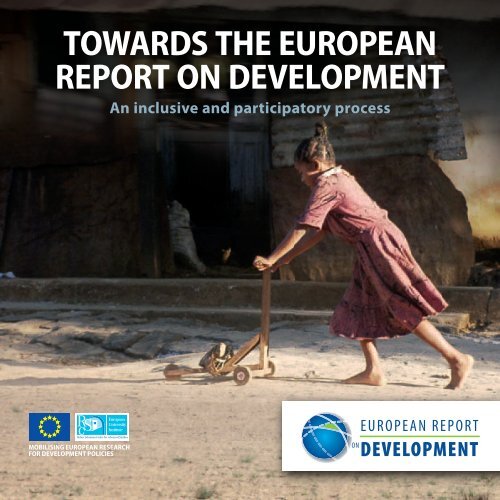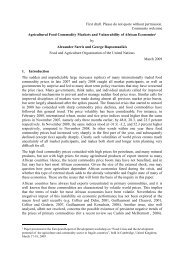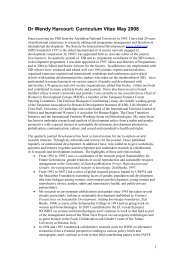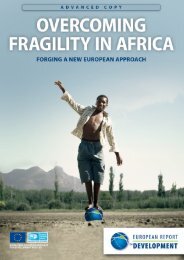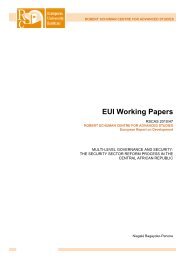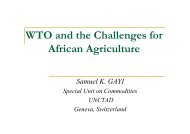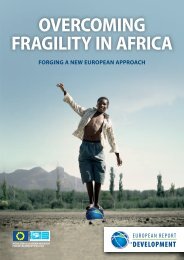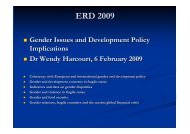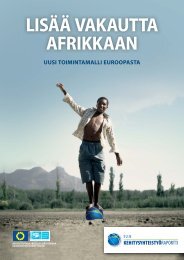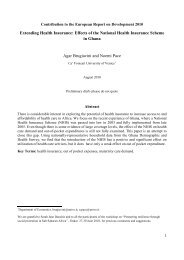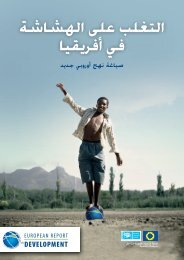TOWARDS THE EUROPEAN REPORT ON DEVELOPMENT - ERD
TOWARDS THE EUROPEAN REPORT ON DEVELOPMENT - ERD
TOWARDS THE EUROPEAN REPORT ON DEVELOPMENT - ERD
Create successful ePaper yourself
Turn your PDF publications into a flip-book with our unique Google optimized e-Paper software.
<strong>TOWARDS</strong> <strong>THE</strong> <strong>EUROPEAN</strong><br />
<strong>REPORT</strong> <strong>ON</strong> <strong>DEVELOPMENT</strong><br />
An inclusive and participatory process<br />
MOBILISING <strong>EUROPEAN</strong> RESEARCH<br />
FOR <strong>DEVELOPMENT</strong> POLICIES
FOREWORD<br />
Policy-making requires accurate, deep and timely knowledge of the situation. And development is no exception.<br />
However, research in this sector has not achieved its full potential for numerous reasons, including fragmentation<br />
of effort, as well as the lack of resources and challenges on the ground which make data collection difficult.<br />
2 3<br />
This is particularly true in the case of ‘fragile countries’. The research work and the intensive debates undertaken for<br />
this year’s European Report on Development (<strong>ERD</strong>) will, through better knowledge, help improve the development<br />
policies and practices employed to address complex situations – including conflicts, weak governance, the<br />
unsustainable exploitation of natural resources, and security threats – that characterise states experiencing<br />
fragility.<br />
A first research paper was already produced in the framework of this initiative in 2008 and helped the EU design<br />
its response to the economic and financial crisis in such a way as to support efforts to achieve the Millennium<br />
Development Goals (MDGs).<br />
The closely linked food, fuel and financial shocks threaten to reverse the recent progress made towards the MDGs.<br />
The human costs of the crises are particularly worrying for fragile Sub-Saharan African countries, where the ability<br />
to cope with shocks is limited. Overcoming fragility is an increasingly important priority in European development<br />
policies. It is also a key challenge for European security strategy.<br />
Building common analytical ground on how better to grasp those difficult situations will help Europe define more<br />
coherent policies. This first edition of the <strong>ERD</strong> is a major leap forward for the European research initiative which<br />
seeks to clarify how to reconcile development goals with new global challenges. The involvement of African<br />
researchers is a valuable component of the initiative.<br />
Françoise Moreau<br />
European Commission<br />
Giorgia Giovannetti<br />
European University Institute<br />
An inclusive and participatory process<br />
MOBILISING <strong>EUROPEAN</strong> RESEARCH<br />
FOR <strong>DEVELOPMENT</strong> POLICIES
A <strong>EUROPEAN</strong> VISI<strong>ON</strong><br />
FOR <strong>DEVELOPMENT</strong><br />
The EU is the world’s largest provider of development assistance<br />
and is deeply committed to achieving the UN’s Millennium<br />
Development Goals (MDGs). The European Report on Development<br />
(<strong>ERD</strong>) is a new initiative which seeks, in close co-operation with<br />
developing and donor country partners, to elaborate a European<br />
perspective on development issues – one that is based on<br />
knowledge excellence, innovation and the building of common<br />
ground between the European research community and policymakers.<br />
In particular, the <strong>ERD</strong> will enrich policy-making processes, stimulate<br />
debate and research on development issues in Europe, and amplify<br />
the EU’s voice in the international arena. Coordinated by the<br />
European University Institute (EUI), the soon-to-be-published first<br />
edition is being drafted following intense networking activities<br />
with scholars, policy-makers and civil society.<br />
The <strong>ERD</strong> 2009 is focusing on the complex and multidimensional<br />
issue of fragility and approaches to tackling it, with a specific focus<br />
on the African continent. Many sub-Saharan African countries are<br />
in situations which can be described as ‘fragile’. The root causes of<br />
this fragility are manifold and include conflict, poor governance,<br />
weak institutions, lack of social cohesion, ethnic fragmentation,<br />
etc.<br />
HANDLE WITH CARE<br />
Countries experiencing fragility are extremely diverse, so there can<br />
be no ‘one-size-fits-all’ approach to their development challenges.<br />
However, one thing they share in common is that their fragility has<br />
severely affected their development prospects.<br />
Since 2005, the issue of ‘fragility’ has been a high on the<br />
EU development agenda. In the European Consensus on<br />
Development, the EU states that it “will improve its response<br />
to difficult partnerships and fragile states, where a third of the<br />
world’s poor live”. In 2007, an extensive debate led to a Commission<br />
Communication, a series of Council Conclusions and a Resolution<br />
by the European Parliament sketching out a comprehensive<br />
‘EU response to situations of fragility’*.<br />
4 5<br />
A 2008 EU research paper entitled ‘Millennium Development Goals<br />
at midpoint: where do we stand and where do we need to go?’<br />
recommended a special development agenda for the so-called<br />
fragile states.<br />
An EU implementation plan, with concrete proposals for a more<br />
coherent and strategic European approach to fragility, is due out in<br />
2009. In addition, Member States adopted an EU response to help<br />
developing countries cope with the effects of the current financial<br />
and economic crisis.<br />
* http://ec.europa.eu/development/policies/9interventionareas/governance_en.cfm
STRENGTH THROUGH<br />
EXCELLENCE<br />
Stakeholder participation has been at the core of the process to<br />
compile the European Report on Development (<strong>ERD</strong>). At the centre<br />
of this multi-stakeholder and multi-disciplinary effort sits the<br />
<strong>ERD</strong> Steering Committee which has provided the leadership and<br />
vision necessary to guide the authorship process. It is composed<br />
of representatives of the European Commission and of the five<br />
EU Member States which are currently co-funding this initiative<br />
(Finland, Luxembourg, Spain, Sweden and the United Kingdom).<br />
The report’s main authors at the European University Institute<br />
have employed a process that is participatory, consultative and<br />
peer-reviewed. The report primarily relies on existing literature,<br />
but original research has been commissioned from specialised<br />
institutes and universities. Each consultation activity built on the<br />
background papers and issues papers which drew on both existing<br />
and new research.<br />
These research papers were validated and discussed during a series<br />
of consultative activities (research workshops and conferences)<br />
prior to the finalisation of the report. Peer consultations of this kind<br />
helped ensure a transparent and participatory authorship process<br />
involving all the main stakeholders in Europe and in Africa.<br />
MAIN FOCUSES<br />
The more precise topics of the research workshops and conferences<br />
included:<br />
6 7<br />
• The various definitions of ‘fragility’, such as those used by various<br />
intergovernmental organisations and national aid agencies.<br />
• Reasons for and determinants of fragility and, in particular, the<br />
challenges related to institutional capacity building.<br />
• How international challenges and new trends – including energy<br />
security, high food prices, the global recession, shifting wealth<br />
and rising South-South co-operation – affect or will affect<br />
situations of fragility in Africa.<br />
• The key role of the agricultural sector in helping fragile countries<br />
progress towards fulfilling the MDGs.<br />
• Donors’ aid policies and approaches in fragile states.<br />
• Analysing, through case studies, successes and failures in<br />
particular national contexts.<br />
• The various EU approaches to fragility, as well as how these link<br />
to the Policy Coherence for Development (PCD) principle, in<br />
particular the security and development nexus. An EU report on<br />
PCD is due out in September.<br />
Cambridge<br />
Barcelona<br />
Brussels<br />
EUROPE<br />
Florence<br />
AFRICA<br />
Accra
SPOTLIGHT <strong>ON</strong> AFRICA<br />
Brussels, 6 th February 2009<br />
The groundwork for the consultation process started on 6 February<br />
2009 when researchers and policy-makers – both from Europe and<br />
Africa –gathered in the EU capital for the <strong>ERD</strong> launch workshop.<br />
At the strategic level, the meeting focused on how research could<br />
help overcome the challenges posed by fragility in developing<br />
countries, particularly in sub-Saharan Africa. It was also an<br />
opportunity to discuss the methodology and mechanics of this<br />
challenging process of research and policy dialogue.<br />
The <strong>ERD</strong>’s lead author, Giorgia Giovannetti of the EUI, sketched<br />
out the outline and main themes of the report and explained how<br />
the serious development challenges posed by fragility will be<br />
approached. To emphasise the importance of addressing fragility,<br />
she noted that, although fragile countries make up only 15% of the<br />
population of the developing world, they account for a third of the<br />
world’s poor and half of child mortality. Most of them (about 30)<br />
are located in sub-Saharan Africa.<br />
Giovannetti underscored the importance of defining fragility in all<br />
its complex variations – stressing how individual states can move<br />
in and out of fragility – which means policy approaches need to<br />
be customised to meet very distinct circumstances. She also noted<br />
that Europe’s own integration experience and enlargement to<br />
encompass countries with different institutions would be analysed<br />
to see whether any lessons can be drawn for Africa.<br />
REINFORCING FRAGILE FOUNDATI<strong>ON</strong>S<br />
One focus of the workshop was the challenges related to institution<br />
building in situations of fragility. Thierry Verdier of the Paris School<br />
of Economics explored this theme in the context of the three core<br />
functions of the state: providing security, delivering basic public<br />
goods and services, and enjoying political legitimacy. He also<br />
focused on some of the most challenging trade-offs, namely the<br />
short versus long term and the so-called globalisation trade-off, as<br />
well as the role of regional integration in overcoming fragility.<br />
TIME OF CRISIS<br />
Franklin Allen of the University of Pennsylvania examined the actual<br />
and potential impact of the current economic and financial crisis<br />
on fragile countries. He explained that many fragile countries were<br />
already vulnerable before the financial crisis erupted due to high<br />
food and energy prices. The current global crisis can exacerbate<br />
their situation through a number of transmission channels, such<br />
as falls in export revenues, worsening terms of trade, declining<br />
migrant remittances, as well as possible drops in aid funding. He<br />
concluded his presentation by analysing China’s role both as a<br />
model for Africa and as an increasingly important donor there.<br />
8 9<br />
Finally, Wendy Harcourt of the Society for International<br />
Development explained why gender inequality and its<br />
development policy implications would be a recurring theme in<br />
the report and throughout its elaboration process.<br />
Brussels, 6 th February 2009<br />
More information:<br />
http://erd.eui.eu/media/erd-flyer-a4_brussels.pdf
FOOD SECURITY IN<br />
FRAGILE COUNTRIES<br />
Cambridge, March 17 th -18 th 2009<br />
Before the financial crisis and the subsequent recession caught the<br />
world’s attention, the global food crisis in 2007 and 2008 seriously<br />
corroded the food security of developing countries, particularly<br />
fragile ones, and the number of people going hungry rose.<br />
A number of factors have been identified as contributing to the<br />
crisis, including unseasonable droughts in grain-producing<br />
nations, rising oil prices, the growing use of biofuels, and higher<br />
demand for meat among the burgeoning Asian middle classes.<br />
Fragile countries being among the most vulnerable to food price<br />
shocks, the <strong>ERD</strong> workshop in Cambridge (UK) on 17-18 March<br />
2009 brought together over 30 leading experts to examine the<br />
‘Food crisis and the development potential of the agricultural and<br />
commodity sector in fragile countries’.<br />
Agriculture is a crucial economic sector in fragile sub-Saharan<br />
African states which also suffer from high food insecurity due<br />
to the predominance of subsistence farming. Adding to their<br />
vulnerability, fragile states are among the largest recipients of<br />
food and humanitarian aid, according to Giorgia Giovannetti, and<br />
the recent economic crisis is likely to push donors to reconsider<br />
their priorities.<br />
SEEDS OF <strong>THE</strong> PROBLEM<br />
Several speakers linked the recent food crisis with the wider<br />
debate on agricultural policy paradigms in sub-Saharan Africa, the<br />
evolution of the agricultural sector there, and the slowing rates of<br />
growth in African farm productivity.<br />
Their presentations considered a number of factors which increase<br />
vulnerability and limit the capacity of the agricultural sector<br />
both to underwrite food security and ensure a stable income for<br />
farmers.<br />
One key factor is the progressive worsening of agricultural terms<br />
of trade coupled with sub-Saharan Africa’s low capacity to benefit<br />
from increasing commodity prices. This is partly due to a lack of<br />
appropriate price signals and access to outlet markets, as well<br />
as insufficient insurance and safety nets. Low investments in<br />
agriculture, agricultural R&D and rural infrastructure have also hurt<br />
productivity, leading many fragile countries to depend more on<br />
food imports, including food aid.<br />
In fragile states, both the public and private sectors are weak, and<br />
agricultural development policy has failed to take account of local<br />
actors and practices. On a wider scale, in addition to the lack of<br />
regional integration, there are the difficulties associated with the<br />
liberalisation of the agricultural sector at global level.<br />
FERTILE POLICY GROUND<br />
The assembled policy practitioners, NGO representatives,<br />
academics and officials from international organisations drew<br />
some policy lessons from the preceding debate. They concluded<br />
that local partners and institutions, both formal and informal,<br />
should be involved in defining and implementing context-specific<br />
responses to fragility.<br />
10 11<br />
Productivity and scaling up in value chains need to be addressed<br />
through institutional, infrastructural and technological reforms.<br />
In addition, aid should combine both short- and long-term<br />
perspectives linking humanitarian aid to agricultural development<br />
policies.<br />
Cambridge, March 17 th 7 - 18 th 2009<br />
More information:<br />
http://erd.eui.eu/?page_id=794<br />
http://erd.eui.eu/media/erd-flyer-a4_cambridge.pdf
POLITICAL<br />
TRANSFORMATI<strong>ON</strong>S<br />
Florence, 16 th -17 th April 2009<br />
The governments of fragile states are usually unable – and some<br />
are even unwilling – to provide the basic public goods and services<br />
citizens expect of them, and suffer from a fundamental lack of<br />
effective state capacity. And where the state is absent, informal<br />
institutions, such as social and family networks, fill the void.<br />
Security is also a critical issue. In certain extreme situations, such<br />
as in the midst of conflict, the utter lack of security can undermine<br />
or derail development efforts. An <strong>ERD</strong> workshop in Florence (IT) on<br />
16 and 17 April 2009 aimed to chart a course for how state capacity<br />
could be built up in developing countries, and looked into ways of<br />
strengthening the security-development nexus.<br />
Weak institutions and the volatility of the security situation in many<br />
fragile countries have profound implications for the development<br />
policy of the countries themselves and donors, such as the EU.<br />
Françoise Moreau from the European Commission’s Development<br />
DG outlined the ongoing efforts to articulate an EU policy on<br />
fragility.<br />
to involve local actors closely. At first, social cohesion is often more<br />
crucial than democracy in this process.<br />
12 13<br />
Overall, a consensus emerged that security is an essential<br />
precondition for development and that sustainability is an essential<br />
requirement for any peace-building process, hence the need to<br />
tackle security problems at their roots.<br />
A STATE OF <strong>DEVELOPMENT</strong><br />
Building up institutions in fragile situations is a major challenge.<br />
Necla Tschirgi of the Centre for International Policy Studies at the<br />
University of Ottawa and Beatrice Pouligny of France’s Centre for<br />
International Studies and Research both underlined the need to<br />
regard ‘state-building’ as a primarily political process in which<br />
external actors need to take into account the past and existing<br />
situation on the ground. Pouligny emphasised the potential<br />
advantage of building on existing local informal institutions and<br />
mechanisms and of relying on local knowledge regarding conflict<br />
resolution.<br />
The international debate on state-building was criticised as being<br />
too normative and not grounded sufficiently in empirical evidence.<br />
Appropriate mechanisms for learning, liaising with local actors, and<br />
being able to adapt to changing situations were recommended.<br />
SECURING STABILITY<br />
Pascal Vennesson and Christian Büger, both of the European<br />
University Institute, considered the vicious circle of protracted<br />
fragility, underdevelopment and insecurity, including the securitydevelopment<br />
dilemma. Participants highlighted in that regard<br />
that each notion was linked to a specific policy debate and that<br />
the security dimension of development assistance was limited to<br />
specific aspects like security sector and justice reforms.<br />
Michael Barnett of the University of Minnesota argued that<br />
external peace-builders run the risk of entering into bargains with<br />
local elites who do not take into consideration the real needs of<br />
the population. He advised the international community to abolish<br />
the paternalistic assumption of “knowing better what to do” and<br />
François Bourguignon of the Paris School of Economics underlined<br />
that a good starting point for an effective state-building process<br />
in Africa is to recognise that external actors are not entitled to<br />
build something new from scratch, but should assist the mainly<br />
endogenous process of state formation.<br />
Seth D Kaplan, a development and foreign policy analyst, argued<br />
that an effective approach in fragile parts of Africa would be to<br />
focus on the promotion of regional integration as an incentive for<br />
effective state formation, as well as on civil society and bottom-up<br />
approaches.<br />
More information:<br />
http://erd.eui.eu/?page_id=1037<br />
http://erd.eui.eu/media/17436_ec_flyer-a4_florence_lr.pdf
STURDY POLICIES FOR<br />
FRAGILE STATES<br />
Barcelona, 7 th - 8 th May 2009<br />
Moving states away from situations of fragility requires solid<br />
policy framework grounded in a thorough understanding of what<br />
fragility is, what causes countries to become fragile, and the specific<br />
situations of individual countries. An <strong>ERD</strong> conference entitled ‘The<br />
challenges of fragility to development policy’ – bringing together<br />
researchers, academics, policy-makers and field workers from<br />
across Europe and beyond – took place in Barcelona in May 2009<br />
to examine these very issues.<br />
A number of speakers pointed out that fragility is an elusive<br />
concept, with different actors applying different definitions. The<br />
UK’s Department for International Development (DFID) defines<br />
‘fragile’ countries as those which “cannot or will not deliver core<br />
functions to the majority of its people”. Paul Collier of Oxford<br />
University offered his own view: “Fragile states are too large to be<br />
a nation [i.e. are ethnically diverse] and too small to be a state [i.e.<br />
have tiny economies].”<br />
The subjectivity and vagueness of the term makes it hard to<br />
measure. “Fragility, as a concept, was a political response to an<br />
operational issue, in particular, the design of aid allocations. It is<br />
difficult to measure but it should be seen in combination with<br />
structural vulnerability,” noted Patrick Guillaumont of C<strong>ERD</strong>I, the<br />
University of Auvergne’s centre for international development<br />
research.<br />
HANDLE WITH CARE<br />
This potential ambiguity has some very concrete repercussions.<br />
For instance, if a certain measure of fragility turns out to be<br />
inappropriate or inaccurate, this would mean that aid allocations<br />
made on that basis may not be effective.<br />
During the discussion, doubts were raised about the usefulness of<br />
the ‘fragility’ label, since it is sometimes used to define countries<br />
that are already ‘broken’, rather than those at risk of breaking.<br />
Concerns were also raised about the relevance of a label that<br />
groups together countries which are of widely divergent economic<br />
and socio-political realities. One clear message that emerged<br />
from the conference is that fragility applies to an extremely<br />
heterogeneous group of countries. In fact, as Stephan Klasen of<br />
the University of Göttingen discovered, “There is remarkably little<br />
correlation between fragility and progress towards the Millennium<br />
Development Goals”, if we take into account the fact that fragile<br />
countries often started from a much lower base point.<br />
RADICAL RETHINKS<br />
There emerged a general consensus that conventional approaches<br />
to aid delivery need to be radically rethought in situations of<br />
fragility, especially the relationship between donor countries and<br />
recipient governments. In that regard, Collier recommended a<br />
“long term compact approach” grouping peacekeepers to provide<br />
security, donors to provide finance and the local governments to<br />
engage in reforms.<br />
Luca Alinovi from the Food and Agriculture Organisation (FAO)<br />
stressed the need for the donor community to adopt a less riskaverse<br />
perspective when dealing with local institutions in fragile<br />
contexts. The ‘political economy’ of fragility, which relates to the<br />
political and strategic interests of governments in deciding whether<br />
and how to intervene in a certain country, was also underlined as a<br />
key factor when analysing policy decisions. Other suggestions for<br />
helping countries move beyond fragility included the promotion<br />
of greater regional co-operation, and an increased commitment<br />
to existing codes and standards related to international trade in<br />
natural resources.<br />
14 15<br />
Closing the conference, the <strong>ERD</strong>’s lead author Giorgia Giovannetti<br />
stressed that the EU, as the world’s number one donor and given<br />
its broad set of instruments and its own internal track record of<br />
promoting stability and development, was well placed to make a<br />
difference.<br />
Barcelona, 7 th 7 - 8 th May 2009<br />
More information:<br />
http://erd.eui.eu/?page_id=1057<br />
http://erd.eui.eu/media/20090518-erd-barcelona-article-v1-final_1.pdf<br />
http://erd.eui.eu/media/17436_ec_flyer-a4_barcelona_lr.pdf
EC<strong>ON</strong>OMIC STORM<br />
DAMAGE<br />
Accra, 21 st - 23 rd May 2009<br />
Despite initial expectations, the current economic and financial<br />
turmoil has not spared Africa. Recent IMF forecasts expect a drop<br />
in economic growth rates for the sub-Saharan region to a mere<br />
1.5% for 2009 from an averaged 6% since 2000.<br />
Most financial markets in sub-Saharan Africa are very small and<br />
poorly integrated, so the global crisis did not hit the continent’s<br />
shores until it began affecting the real economy. “Although we<br />
were spared the first-round effects, we are suffering in the second<br />
round,” observed Joe Masawe of the Bank of Tanzania.<br />
For these countries where economic growth is crucial in their quest<br />
to achieve the Millennium Development Goals, this slowdown has<br />
serious socio-economic implications. According to figures from<br />
the African Development Bank, 27 million more people could fall<br />
into extreme poverty, while the International Labour Organisation<br />
expects a rise in unemployment by 8.5%.<br />
To take stock of the situation and prescribe possible policies and<br />
actions, 80 European, African and international researchers and<br />
policy-makers gathered in May in the Ghanaian capital of Accra for<br />
an <strong>ERD</strong> conference entitled ‘Financial markets, adverse shocks and<br />
policy responses in fragile countries’.<br />
The shock has been especially severe in those countries that are<br />
politically unstable, such as the Democratic Republic of Congo and<br />
Sudan, noted Victor Davies of the African Development Bank. In<br />
addition, decreasing income streams could push some previously<br />
stable countries towards fragility, the assembled experts agreed.<br />
The impact on countries in situations of fragility could be<br />
devastating, essentially because they are often more vulnerable<br />
and less resilient to external shocks, Giovannetti explained.<br />
However, there was a general consensus among the participants<br />
that the degree of vulnerability and resilience to external shocks<br />
varies significantly among fragile African countries.<br />
Going from the macro to the micro level and to establish what this<br />
means concretely for Africa’s poor, Abena Oduro of the University of<br />
Ghana explored what effects economic shocks can have on African<br />
households and the coping strategies they employed to deal<br />
with them, while Wendy Harcourt of the Society for International<br />
Development examined the gender angle of fragility.<br />
SHOCK ABSORBERS<br />
To prevent the worst from happening requires timely intervention<br />
based on the careful monitoring of the situation in each country.<br />
Towards that end, the EU recently adopted a response package<br />
to help developing countries cope with the global crisis, the<br />
Commission’s representative Nicolas Gérard told the gathering.<br />
NEW FACES,<br />
NEW PERSPECTIVES<br />
16 17<br />
The IMF’s representative Sanjeev Gupta observed that many African<br />
countries, unlike developed countries, do not have scope for fiscal<br />
expansion to cushion the shock. Donors should take up some of<br />
the slack, he noted, with priority going to expanding social safety<br />
nets and infrastructure expenditures.<br />
As foreign financial sources dry up, the need to tap the underutilised<br />
home front has become pressing, emphasised Ernest Aryeetey of<br />
the Institute of Statistical, Social and Economic Research at the<br />
University of Ghana. In addition, African countries should improve<br />
their financial markets which are currently hindered by a number<br />
of factors, including low population densities, stressed Franklin<br />
Allen of the University of Pennsylvania. This would help them to<br />
overcome their vulnerable dependence, highlighted by Philippe<br />
Martin from Sciences-Po, on foreign financing for their exports.<br />
African researchers have an important role to play in tackling<br />
the development challenges facing their countries. In a bid to<br />
support young African academics and highlight their work, 15<br />
researchers from across Africa presented their research at the<br />
conference, as part of the ‘New Faces for African Development’<br />
initiative launched by the European University Institute in the<br />
context of the <strong>ERD</strong> process.<br />
Together, the talented young researchers – who were drawn<br />
from an original pool of 158 submissions from 38 countries –<br />
provided valuable snapshots from the field. The issues they<br />
covered included the causes and consequences of fragility, how<br />
it affects education, the use of traditional African governance<br />
mechanisms to decentralise power, electoral violence and<br />
fragility, Zimbabwe’s descent into fragility, oil management<br />
and food insecurity in Nigeria, gender discrimination in the<br />
labour market in Cameroon, as well as the link between aid and<br />
growth.<br />
DESTABILISING FORCES<br />
According to the <strong>ERD</strong>’s lead author Giorgia Giovannetti, the<br />
crisis reached Africa through a number of indirect transmission<br />
channels, such as falling exports, a drop in remittances from<br />
diaspora communities, reduced access to trade finance, lower<br />
levels of foreign direct investment, as well as potential reductions<br />
in future foreign aid flows.<br />
Accra, 21 st - 23<br />
rd May 2009<br />
More information:<br />
http://erd.eui.eu/?page_id=837<br />
http://erd.eui.eu/media/20090603-post-accra-pressrelease2en.pdf<br />
http://erd.eui.eu/media/20090604_ec_flyer-a4_accra.pdf
18<br />
<strong>THE</strong> FINAL CHAPTER<br />
The underlying aim of all the preparatory events and the<br />
commissioned research papers is to provide input for and inform<br />
the drafting of the European Report on Development (<strong>ERD</strong>). At<br />
the beginning of the <strong>ERD</strong> process, the report’s core team came up<br />
with a tentative outline and structure for the report – which was<br />
mirrored by the themes selected for workshops and conferences.<br />
The themes covered by the original outline included the drivers<br />
and consequences of fragility; the challenges of institution<br />
building in fragile situations; food crises and the development of<br />
the agricultural sector; the impact of the financial crisis on fragile<br />
countries; and the policy implications of fragility.<br />
COUNTERING FRAGILITY WITH RESILIENCE<br />
In Florence, and during the preparatory process in general, a<br />
consensus has emerged that resilience needs to be promoted as<br />
a counterbalance to fragility. Resilience involves a wide range of<br />
issues, including land reform, the development of the agricultural<br />
sector, as well as the strengthening of coping mechanisms and<br />
social safety nets.<br />
Participants agreed that the EU’s development policies – and that<br />
of other donors – needed to be radically rethought to address<br />
the very specific needs of fragile countries. In addition, the Union<br />
needs to do more to utilise its potential in terms of the three ‘Cs’<br />
(coordination, complementarity and coherence).<br />
<strong>THE</strong> FINAL STRETCH<br />
Conference on the consolidated draft report<br />
Brussels (BE)<br />
Final version of <strong>ERD</strong><br />
Official launch<br />
Brussels (BE)<br />
European Development Days<br />
Stockholm (SE)<br />
Further presentation events will be organised, both in Europe and abroad.<br />
This Commission-hosted conference enables stakeholders to<br />
discuss and comment on the consolidated version of the <strong>ERD</strong><br />
and to refine its policy recommendations.<br />
<strong>ERD</strong> Steering Committee receives the final version of the<br />
report for validation<br />
4 September 2009<br />
1 October 2009<br />
The official media event launching the <strong>ERD</strong>. 15 October 2009<br />
The report to be presented in Stockholm at the European<br />
Development Days.<br />
23 October 2009<br />
19<br />
In light of the consultation process and the various papers<br />
commissioned as part of the <strong>ERD</strong> initiative, a first draft of the<br />
Report was presented at the final preparatory event – ‘Moving<br />
towards the European Report on Development 2009’ – which took<br />
place in Florence in June 2009. Around 50 prominent researchers<br />
and experts attended the conference where they discussed the<br />
draft chapters and the <strong>ERD</strong>’s structure.<br />
Florence,<br />
22 nd - 23rd June 2009<br />
MEET <strong>THE</strong> TEAM<br />
The <strong>ERD</strong> core team is made up of 11 members:<br />
Giorgia Giovannetti – Team leader of the <strong>ERD</strong> report. She is a full<br />
professor of economics at the University of Florence and a visiting<br />
professor at the European University Institute and at the New York<br />
University in Florence.<br />
Franklin Allen – Professor of finance and economics at The<br />
Wharton School of the University of Pennsylvania and co-director<br />
of the Wharton Financial Institutions Centre.<br />
Shailaja Fennell – Lecturer in Development studies attached to<br />
the Department of Land Economy at Cambridge University, fellow<br />
of the university’s Jesus College.<br />
Wendy Harcourt – Editor of the journal Development and senior<br />
adviser at the Society for International Development.<br />
Marta Reynal-Querol – Associate professor of economics at the<br />
University Pompeu Fabra in Barcelona and affiliated professor at<br />
the Barcelona Graduate School of Economics.<br />
Pascal Vennesson – Professor of political science and joint chair<br />
of ‘Security in Europe’ at the European University Institute.<br />
Thierry Verdier – Professor of economics and scientific director of<br />
the PSE (Paris School of Economics)<br />
Ingo Linsenmann – <strong>ERD</strong> project manager at the Robert Schuman<br />
Centre for Advanced Studies in Florence.<br />
Simone Bertoli – <strong>ERD</strong> project assistant at the European University<br />
Institute and research fellow at the Institute for Employment<br />
Research in Nuremberg.<br />
Marco Sanfilippo – <strong>ERD</strong> project assistant at the European<br />
University Institute and researcher on Chinese FDI in Europe at the<br />
Centre for Advanced Studies on Contemporary China.<br />
Elisa Ticci – <strong>ERD</strong> project assistant at the European University<br />
Institute, lecturer in economics at the University of Florence and<br />
consultant for the World Bank.
<strong>TOWARDS</strong> <strong>THE</strong> <strong>EUROPEAN</strong><br />
<strong>REPORT</strong> <strong>ON</strong> <strong>DEVELOPMENT</strong><br />
An inclusive and participatory process<br />
http://erd.eui.eu/<br />
MOBILISING <strong>EUROPEAN</strong> RESEARCH<br />
FOR <strong>DEVELOPMENT</strong> POLICIES


